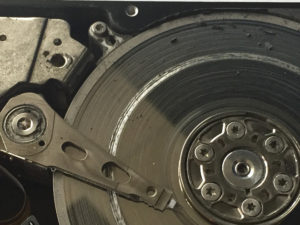Data recovery software providers often make unsubstantiated claims about their products — and for some consumers, those claims lead to permanent data loss.
In other articles, we’ve discussed the potential dangers of using software to treat file corruption, restore deleted files, or address other common data recovery scenarios.
But we also recognize that professional data recovery services can be expensive. To that end, we provide risk-free price quotes and support our services with a no data, no charge guarantee: If we can’t restore the files you need, you don’t pay for the attempt.
Even so, data recovery software is tempting, particularly if you’re fairly certain that you know the source of data loss. Before paying for software, ask yourself a few questions:
1. Does my data storage device show any symptoms of physical failure?
Data recovery software cannot work if the device isn’t operational. That may sound obvious — but many consumers fail to recognize the symptoms of physical issues, particularly with solid-state drives (SSD) and other flash-based media.
Some common symptoms of physical issues include:
- The computer fails to recognize the device.
- The computer recognizes the device, but operations (such as saving a file) take a long time to complete.
- Hard drives make unusual noises or fail to spin up.
- Files on the device become corrupt or unreadable.
- The operating system sees the device as unformatted, or misrepresents the device’s storage capacity.
If a device suffers from physical damage, running data recovery software can put your data at risk. Hard drives may sustain platter damage, even if they don’t show clear physical symptoms (such as clicking sounds). Software can also exacerbate file corruption on any failing device.
2. Where will I install the data recovery software?
If you run data recovery software from the device that holds the target data, the software may overwrite your files before you have a chance to recover them.
We strongly recommend making a complete clone (copy) of your device, then connecting that clone to another system to use data recovery software.
Here’s a guide for creating a clone with ddrescue, a powerful, free utility included on many Linux distributions. ddrescue is also usable on Windows and Mac operating systems.
Remember, you should never install data recovery software to your target device. If you’re uncomfortable with cloning your drive and connecting it to a secondary system, the safest course of action is to work with a professional data recovery provider.
3. Does the software provider make unrealistic claims about the product’s capabilities?

This hard drive shows rough platter damage where the head remained in contact with the platters for several hours of operation.
Before downloading software, do your research. That starts with evaluating marketing claims: If a product claims to be able to treat failing hard drives or deleted data on an SSD, it’s not a reliable option.
Additionally, we recommend reading user reviews from unbiased sources (such as Reddit’s /r/datarecovery community; use the search bar on the page to find information about a specific software tool).
You should also read the software’s documentation — make sure you understand how it works, its limitations, and its capabilities.
4. What would I do if my data is permanently lost?
Even in the best circumstances, running data recovery software means taking a risk. Cloning your device could cause permanent damage, especially if your hard drive or SSD is in the initial stages of failure.
And if the software isn’t able to recover your files, you’ll probably still pay for the attempt — most software providers do not offer guarantees.
We recognize that we’re biased, but this isn’t just our opinion. On the aforementioned Reddit data recovery community, their sidebar notes:
If what you are trying to recover is important GO TO A PRO! This includes your own data, or customer data. Odds are VERY HIGH that you will lose your data forever if you are working on this without expertise.
If you’re simply interested in data recovery tools — and you have a backup plan if your data is permanently lost — there’s no harm in installing software and trying it out.
However, if the data is essential, you should always work with a professional provider. Datarecovery.com offers risk-free price quotes for all standard cases, and our no data, no charge guarantee ensures that you don’t pay if your data is unrecoverable.
With full-service laboratories at every location, we give you peace of mind in an emergency — and fast access to lost files. To learn more, call us at 1-800-237-4200 or schedule a risk-free evaluation online.





